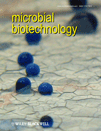
BIOTECHNOLOGY LETTERS
Scope & Guideline
Exploring the Cutting Edge of Biotechnological Advancements
Introduction
Aims and Scopes
- Bioprocess Engineering and Optimization:
Research on the optimization of bioprocesses, including fermentation techniques, enzyme production, and microbial metabolism, aimed at improving yield and efficiency in various biotechnological applications. - Synthetic Biology and Genetic Engineering:
Studies involving the design and modification of biological systems, including the use of CRISPR technology for genome editing, metabolic engineering, and the development of novel biocatalysts. - Microbial Biotechnology:
Focus on the utilization of microorganisms for industrial applications, including bioremediation, bioconversion of waste materials, and the production of biofuels and biopolymers. - Biopharmaceuticals and Therapeutics:
Research dedicated to the development of biopharmaceutical products, including vaccines, monoclonal antibodies, and gene therapies, focusing on innovative delivery systems and therapeutic strategies. - Environmental Biotechnology:
Studies addressing the use of biotechnological approaches for environmental protection, including waste treatment, pollution control, and the sustainable use of resources.
Trending and Emerging
- CRISPR and Advanced Genetic Engineering:
The application of CRISPR technology for precise genome editing is rapidly increasing, marking a trend towards more sophisticated genetic manipulation techniques that enhance productivity and functionality in various organisms. - Microbial Fuel Cells and Bioenergy Production:
Research focused on microbial fuel cells and other bioenergy technologies is trending, emphasizing sustainable energy solutions through biological processes that utilize waste materials. - Biomaterials and Tissue Engineering:
There is a growing interest in the development of biomaterials for tissue engineering applications, highlighting innovations in scaffold design and regenerative medicine. - Machine Learning and AI in Biotechnology:
The integration of machine learning and artificial intelligence in biotechnological research is emerging, with studies focusing on predictive modeling and data analysis to enhance bioprocess efficiencies. - Biodegradable Plastics and Sustainable Materials:
Research into biodegradable plastics and sustainable materials is trending, reflecting increased public and scientific interest in addressing plastic pollution through biotechnological solutions.
Declining or Waning
- Traditional Fermentation Techniques:
Research focused on classical fermentation methods appears to be waning, with a noticeable shift towards more advanced and optimized bioprocessing techniques that leverage modern technologies. - Plant Biotechnology:
Although still relevant, the focus on plant-based biotechnology, including plant tissue culture and genetic modifications in crops, has diminished in favor of microbial and synthetic biology approaches. - Enzyme Characterization without Applied Context:
There is a decline in studies that solely characterize enzymes without demonstrating their practical applications in biotechnological processes, as the field increasingly prioritizes functional relevance.
Similar Journals

BIOTECHNOLOGY AND BIOENGINEERING
Shaping Tomorrow's Biotechnological BreakthroughsBIOTECHNOLOGY AND BIOENGINEERING, published by Wiley, is a leading journal in the domains of applied microbiology, biotechnology, and bioengineering. With an ISSN of 0006-3592 and E-ISSN of 1097-0290, this journal has established itself as an essential resource for researchers, professionals, and students aiming to advance their knowledge and stay updated on cutting-edge innovations and methodologies in biotechnology. The journal has a commendable impact factor, and it is ranked in the second quartile (Q2) across multiple categories for 2023. This positions it favorably among its peers, underscoring its significance in the scientific community; for example, it ranks 23rd out of 127 in the field of Applied Microbiology and Biotechnology. As a hub of critical research findings and technological advancements, BIOTECHNOLOGY AND BIOENGINEERING invites contributions that push the boundaries of biotechnological applications, fostering a deeper understanding and development of sustainable solutions to current global challenges.

TRENDS IN BIOTECHNOLOGY
Pioneering Research for a Biotechnological FutureTRENDS IN BIOTECHNOLOGY, published by CELL PRESS, stands as a premier journal since its inception in 1983, focusing on the dynamic and ever-evolving fields of bioengineering and biotechnology. With a notable impact factor and ranking in the top quartile (Q1) of its categories for 2023, this journal is recognized for its contribution to advancing scientific knowledge, boasting a Scopus rank of #5/311 in Biotechnology and #5/162 in Bioengineering, placing it in the 98th and 97th percentiles, respectively. Although it does not operate under an open access model, TRENDS IN BIOTECHNOLOGY ensures a rigorous peer-review process that provides a platform for high-quality research that influences both academic and industrial advancements. The journal's objectives encompass the dissemination of cutting-edge research findings, reviews, and insights that foster innovation in biotechnological applications, making it an invaluable resource for researchers, professionals, and students alike. With its broad scope across the intersection of biosciences and technology, TRENDS IN BIOTECHNOLOGY continues to lead discussions and developments that shape the future of the biotechnology landscape.

Microbial Biotechnology
Pioneering breakthroughs in applied microbiology and biotechnology.Microbial Biotechnology, published by WILEY, stands at the forefront of innovation in the field of applied microbiology and biotechnology, showcasing cutting-edge research and advancements within both academic and industrial contexts. As an Open Access journal since 2012, it ensures that high-quality research is easily accessible to researchers, professionals, and students globally, promoting knowledge sharing and collaboration. With an impressive impact, the journal holds a Q1 ranking in its categories—Applied Microbiology and Biotechnology, Biochemistry, Bioengineering, and Biotechnology—demonstrating its significance in the scientific community. The journal currently boasts a strong Scopus ranking in several relevant disciplines, including a top 10% position in Applied Microbiology and Biotechnology, highlighting its critical role in disseminating influential findings. Designed to foster dialogue and advance technology within the microbial sciences, Microbial Biotechnology is an essential resource for anyone committed to leveraging microbial processes for sustainable and innovative solutions.

New Biotechnology
Driving Impactful Discoveries in BioengineeringNew Biotechnology, published by Elsevier, is a distinguished academic journal focused on the innovative realms of biotechnology and bioengineering. With an impact factor reflecting its strong presence in the field, this journal serves as a vital resource for researchers and professionals in the life sciences, offering insights into cutting-edge advancements and applications in biotechnology, molecular biology, and related disciplines. The journal's open access policy enhances its accessibility, allowing broad dissemination of knowledge and research findings. With a robust set of Scopus ranks placing it in the top tiers of its categories, including rank #36 in Biotechnology and #24 in Bioengineering, New Biotechnology represents a critical platform for scholars aiming to contribute to the ongoing dialogue in these rapidly evolving fields. Since its inception in 2008 and continuing through to 2024, the journal remains committed to fostering innovation and collaboration among scientists dedicated to advancing biotechnological applications, thereby significantly impacting medicine and industry.

Research Journal of Biotechnology
Advancing biotechnology through impactful research.Research Journal of Biotechnology is a premier publication dedicated to advancing the field of biotechnology through the dissemination of impactful research articles. Published by Research Journal Biotechnology in India, this journal operates under an Open Access model, facilitating unrestricted access to high-quality research for researchers, professionals, and students worldwide. With an ISSN of 2278-4535 and an E-ISSN of 2278-4535, the journal aims to serve as a comprehensive platform for innovative studies in Applied Microbiology and Biotechnology, Bioengineering, and Biotechnology. Despite its current Q4 quartile ranking in these categories, the journal aspires to extend its influence and visibility in the academic community, aiming for greater impact in the future. The journal features research articles that span a wide array of topics in biotechnology, fostering a collaborative and knowledge-rich environment for national and international scholars. We invite you to explore, contribute to, and engage with the expanding landscape of biotechnological research through the Research Journal of Biotechnology.

CRITICAL REVIEWS IN BIOTECHNOLOGY
Exploring Innovative Insights in Applied MicrobiologyCRITICAL REVIEWS IN BIOTECHNOLOGY, published by Taylor & Francis Ltd, stands as a leading journal in the field of biotechnology, consistently recognized for its rigorous peer-reviewed articles that impact the disciplines of Applied Microbiology, Biotechnology, and Medicine. With an impressive Q1 ranking in these categories and a significant influence reflected in its Scopus rankings—placing it within the top 5% of Applied Microbiology and the top 4% of Biotechnology journals—the journal serves as an essential resource for researchers, professionals, and students alike. Launched in 1983 and extending its coverage to encompass groundbreaking findings through 2024, it provides a rich forum for insightful reviews and innovative research that propel the field forward. Though not an Open Access journal, CRITICAL REVIEWS IN BIOTECHNOLOGY remains a vital point of reference for ongoing developments, critical analyses, and emerging trends, making it indispensable for those seeking to stay at the forefront of biotechnological advancements.

Synthetic and Systems Biotechnology
Driving Discoveries in Applied Microbiology and BeyondSynthetic and Systems Biotechnology, published by KEAI PUBLISHING LTD, is a pioneering open-access journal that has made significant contributions to the fields of applied microbiology, biotechnology, biomedical engineering, genetics, and structural biology since its inception in 2016. With an ISSN of 2405-805X, this journal is committed to fostering innovative research and interdisciplinary collaboration, providing a platform for the dissemination of high-quality studies that push the boundaries of scientific knowledge. Recognized for its excellence, it holds prestigious Q1 rankings in both Applied Microbiology and Biotechnology as well as Biomedical Engineering in 2023, alongside notable Q2 rankings in Genetics and Structural Biology. Researchers, professionals, and students alike can access cutting-edge research that explores the dynamic interplay between synthetic biology and systems biology, driving advancements that could reshape health, industry, and environmental sustainability. By operating under an open-access model, Synthetic and Systems Biotechnology ensures that new findings are accessible to a global audience, thereby maximizing the impact and reach of the published work and paving the way for future discoveries.

JOURNAL OF GENERAL AND APPLIED MICROBIOLOGY
Exploring the vital role of microorganisms in health and environment.JOURNAL OF GENERAL AND APPLIED MICROBIOLOGY, published by the MICROBIOL RES FOUNDATION, is a vital resource in the fields of applied microbiology and biotechnology, as well as in diverse medical applications, serving an academic community dedicated to advancing microbial science. Established in 1955, this journal has a rich history of disseminating innovative research and insights into the intricate world of microorganisms. With an ISSN of 0022-1260 and an E-ISSN of 1349-8037, the journal maintains high scholarly standards and robustness, reflected in its 2023 Scopus rankings placing it in the Q3 and Q4 quartiles within its categories. While primarily based in Japan, the journal engages a global audience, offering valuable contributions that inform both theoretical perspectives and practical applications in microbiology. Despite being a non-open-access publication, it provides pivotal research findings essential for academics, professionals, and students alike, fostering a deeper understanding of microbial impact on health and the environment.

BIOTECHNOLOGY ADVANCES
Unleashing Potential through Biotechnology ResearchBIOTECHNOLOGY ADVANCES is a premier, peer-reviewed journal published by PERGAMON-ELSEVIER SCIENCE LTD, dedicated to advancing knowledge in the rapidly evolving fields of biotechnology and bioengineering. With an ISSN of 0734-9750 and an E-ISSN of 1873-1899, this esteemed journal covers a wide spectrum of topics relevant to applied microbiology, molecular biology, and biochemical innovation. Recognized for its academic rigor, it holds a distinguished position in the top quartile (Q1) in multiple categories, including Applied Microbiology and Biotechnology, Bioengineering, and Biotechnology, further evidenced by its high rankings in Scopus, where it ranks #3/127 in Applied Microbiology and Biotechnology and #7/311 in Biotechnology. Researchers and professionals in the field value the journal not only for its comprehensive coverage of cutting-edge research but also for its commitment to disseminating critical findings and fostering collaboration. While BIOTECHNOLOGY ADVANCES currently operates under a subscription model, its potential impact on future innovations in biotechnology cannot be overstated, making it an essential resource for anyone interested in the forefront of biotechnological advancements.

BIOTECHNOLOGY PROGRESS
Unveiling the Latest Trends in BiotechnologyBIOTECHNOLOGY PROGRESS, a prominent journal published by Wiley, stands at the forefront of the biotechnology field, delivering cutting-edge research and emerging trends since its inception in 1985. With an ISSN of 8756-7938 and an E-ISSN of 1520-6033, this journal has carved out a significant niche within the academic community, reflected in its Q2 ranking within the Biotechnology category for 2023. Maintaining a strong presence in the Scopus database, it ranks #111 out of 311 in the categories of Biochemistry, Genetics, and Molecular Biology, demonstrating its commitment to quality and significance in the field. Although it does not offer open access, it remains accessible through various institutional subscriptions, ensuring that vital biological and biotechnological discoveries reach a broad audience, including researchers, professionals, and students. Given its rigorous peer-review process and a focus on innovative methodologies, BIOTECHNOLOGY PROGRESS is an indispensable resource for anyone looking to stay informed about the latest advancements and applications in biotechnology.